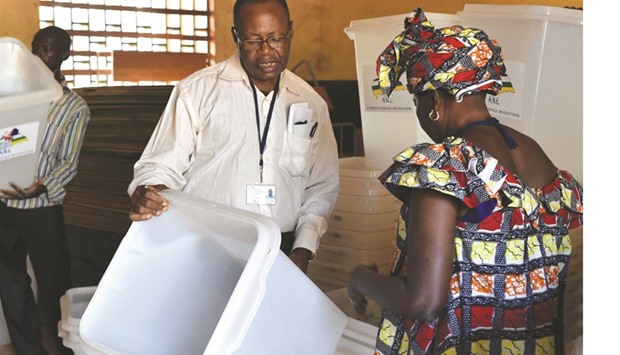The Central African Republic votes today in presidential polls, in which all leading candidates have vowed to reunite a nation torn and terrified by unprecedented sectarian strife.
Postponed several times due to violence and logistical problems, the first round of the polls was again delayed by three days from Sunday, partly because of reports of clashes in regions where armed gangs still hold sway.
The vote, which also includes legislative polls, follows a referendum on constitutional change that was backed by a resounding 93% of voters, widely seen as showing how much people long for peace and a return to normal life.
Three men are tipped as front-runners in a race with 30 candidates. All are experienced politicians who held high-profile posts in previous governments and one comes from the small Muslim minority population.
The violence in the mineral-rich but dirt poor country followed the ouster in March 2013 of president Francois Bozize by a mainly Islamic rebel alliance, the Seleka, which installed Michel Djotodia, the first Muslim head of state of a mostly Christian country.
Djotodia quit in January 2014 after disbanding the Seleka, but attacks on Christians by rogue Muslim forces led to brutal reprisals against Muslim districts by “anti-balaka” (“anti-machete”) militias from Christian communities.
Thousands were slaughtered in a spiral of atrocities that drove about one in 10 of the population of 4.8mn to flee the country.
Christians and Muslims alike came forward massively to ensure their names were on the electoral roll and to collect their voters’ cards, often saying they never again wanted to hear gunfire or other manifestations of violence.
Top electoral officials also urged a three-day delay because voting materials were not reaching isolated areas and some voters’ cards had yet to be printed and handed out, while polling station staff needed last-minute training.
While 30 candidates vie to become president, at least 1,800 people want a place in the 105-seat National Assembly, but by the weekend, the National Elections Authority (ANE) had not cleared a valid final roster for the parliament poll.
Two of the three men far ahead of the crowd in the presidential race were prime ministers under the late president Ange-Felix Patasse: Anicet Georges Dologuele and Martin Ziguele, who are both Christian.
The third, Abdoul Karim Meckassoua, is a Muslim with a serious chance in the race and a good business reputation. He served Bozize from 2003-13 in succesive posts, including as foreign minister.
Up to the end of campaigning late Monday, candidates were handing out cash and T-shirts in Bangui and in remote provinces for those who could afford to use aircraft
instead of ruinous roads.
The three previous presidents are barred from standing again. Catherine Samba Panza has overseen a political transition while the country has licked deep sores and benefitted from a blood transfusion by donor nations, France in the lead.
Bozize and Djotodia are both in exile and both face UN and US sanctions stemming from violence. The latter stepped down under strong foreign pressure after failing to rein in forces that led to fears of genocide along religious fault-lines.
CAR’s own security forces—the army, the police and the paramilitary gendarmerie—have begun to patrol areas where tension remains high between ex-Seleka and
anti-balaka forces.

Election workers check vote materials at a polling station in Bangui on the eve of country’s presidential and legislative elections yesterday.
